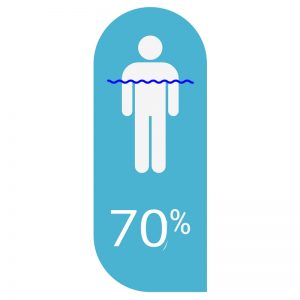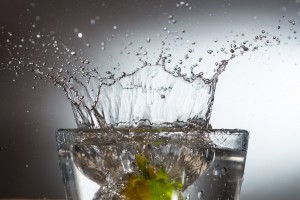We are bombarded by the media with messages to drink water. The volume quoted by many is 2 litres per day, but that’s irrelevant here. What we’re interested in is why. Why do we need to ensure our intake of water is sufficient?
To explain that, a little physiology is called for.
And a word of caution – figures quoted in different sources vary, what we have included here are estimates and averages, approximations if you like. But it is a good illustration of what the percentages are like.
Human bodies are approximately 70% water.
Just think about that for a moment.
Actually stop and look at yourself in a mirror.
Nearly three quarters of you is made up of water. How amazing is that.
Two thirds of that water in our body is intracellular – meaning it is inside a cell; the remaining third is extracellular (this includes blood plasma).
Blood is around 85-90% water.
The brain is around 80% water.
Muscles are about 75% water.
Cells are around 90% water.
Bones are about 25% water.
It’s claimed that a human can survive about a month without food, but only a few days, a week at best, without water.
Best way to check you are hydrated?
If you’re drinking a fair amount and going to the toilet regularly, chances are you are pretty hydrated. When you do go, take a note of the colour – the darker the colour the more dehydrated you are. The most obvious way to tell if you are more seriously dehydrated by how thirsty you feel, but on an intracellular level your body will be suffering before this symptom if felt.
Effects of dehydration
- Chemical reactions in the body need water to function effectively. These processes will be compromised.
- Hormones and nutrients need water to be transported around the body. These, and other substances will not reach their target areas without water.
- Water is used in the lubrication and cushioning of joints – reduced water can lead to joint dysfunction, restricted movement and pain.
- Oxygen is transported around the body with the help of water. Without oxygen we simply cannot survive. Without oxygen muscles will not function.
- Carbon dioxide is removed from body cells to lungs with the help of water.
- Water helps to dilute toxic and waste substances and transport them to the kidneys and liver for cleaning or removal from the body.
- Water helps to distribute heat around the body – without this help overheating will occur.
- Balancing electrolytes is essential for athletic performance. With good hydration levels sodium, potassium and calcium can be moved from blood plasma and interstitial fluid freely. If these elements are unbalanced performance suffers and cramp is a real threat.
 It is common for athletes to sweat when performing.
It is common for athletes to sweat when performing.
Dehydrating only 2% of body weight can impair your physical performance:
- increased heart rate
- decreased cardiac output
- drained mental sharpness
- reduction in muscle power and endurance
- risk of heat stroke
- mental confusion
- loss of coordination
- fatigue
- muscle weakness
- muscle cramps
At only 10% dehydration muscle spasms, confusion, difficulty breathing and even unconsciousness can occur. Even with a modest level of dehydration the adverse effects on the body are noticeable and performance levels will be reduced.
Staying hydrated is really not very difficult. To be quite frank, we don’t see why so many people seem to resist drinking water so strongly. It keeps us alive, keeps our bodies working efficiently and keeps us clean on the inside. Make sure you are hydrated, before exercise have some extra water to prevent fluid levels dropping significantly through sweat loss.
Finally, don’t wait until you are thirsty before drinking some water. That goes for cold weather days too.





